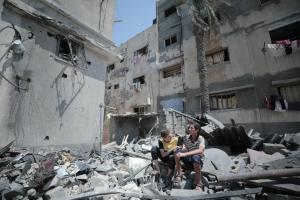
We are all familiar with the October 7th surprise attack by the resistance group Hamas against unsuspecting Israelis.
We also know about Israel’s relentless bombing campaign that started the next day and continues even to this moment.
Let’s play a game.
Thought experiment #1
Imagine you’ve been in a coma for two months, and you just woke up today. You turn on the TV to see what’s going on in the world, and all the news programs are talking about the devastation in Gaza. They show film clips of hospitals and ambulances that have been bombed. Mosques, churches, and schools that have been destroyed. Entire neighborhoods that have been leveled.
You see body bags, newly-orphaned children, men digging through rubble with their bare hands, searching for family members. Doctors who haven’t slept in days, explaining how they perform surgeries on the injured by the light of their cell phone, and without the proper anesthesia.
A doctor walks into your room to see how you’re feeling. You’re horrified by everything you’ve just seen, and you tell her so.
“What is going on here? There is no excuse for this carnage. There is nothing that anyone could do to deserve this. It is absolutely unacceptable. Whoever is doing this is barbaric, savage.”
When you stop to take a breath, the the doctor tries to explain what happened a few weeks ago, that brought this war on. She tries to tell you that something really awful happened on October 7th – something you don’t know about.
But you won’t listen. You are fixated on what’s happening now. Nothing else matters. Nothing is relevant except this moment, the depravity you are witnessing.
What are you doing here? Refusing to understand context. Context matters.
Context doesn’t excuse the depravity of the moment, but it enables us to understand why people do what they do. It grants the transgressor humanity. Human beings do things – including horrific things – for a reason. Nonhumans do horrific things because they are beasts and brutes, bloodthirsty and incapable of intelligent thought.
If you want to voice an opinion about the incident, that’s your prerogative. But if you do so irresponsibly, you can do real damage. So let’s find out the context of the situation before we pass judgment on it.
Context #1
In the case of the destruction of Gaza and the killing of 10,000 Palestinians, Israel has a reason for what it is doing: it suffered a terrible massacre. Israeli people were killed, the country was traumatized, its leaders were humiliated. That’s the context we must acknowledge. Of course the government and many citizens want to take action against the perpetrators. They want to ensure that this will never happen again.
This is a good time to also recall that “Israel” is not a person to whom we can assign emotions and attitudes. The individuals who live there and who govern there have emotions and attitudes. Some of those individuals want all Palestinians to disappear, others sympathize with their plight.
Now that we have filled in some context, we have earned the right to judge whether the Israeli government’s response is appropriate.
But first, let’s do one more thought experiment.
Thought experiment #2
Imagine you were in that coma, but this time you wake up on October 7th. You see the news, and you’re naturally horrified by the images of masked men with machine guns, young people running and screaming, burnt out houses, dead bodies. Nobody knows what the death toll is yet, but it’s going to be high.
The scene makes no sense. It’s inexcusable, unacceptable.
But instead of jumping to the conclusion “whoever did this is barbaric, savage,” this time you ask for context. This time you want to understand what’s going on – not so that you can excuse what you’re seeing, but so that you can begin to understand it. You know those masked men are human beings, and human beings do things (including bad things) for a reason (sometimes a bad reason).

Crash course
You listen to people who have a real grasp of the situation, people who can be trusted. And you learn. A few of the things you learn are:
This was not a random attack. It only seemed that way because you just woke up. This attack was a response to decades of injustice meted out by Israel (paid for in part by aid from United States to the tune of $13 million a day).
Palestinians have been on the land for centuries. There has always been a Jewish presence too, but most of the Jews there today came from Europe and other places around the time of the Holocaust. and settled.
In 1947, the UN proposed a Partition Plan, in which part of Palestine would belong to the indigenous Palestinian Arabs, and part would belong to Jews. Palestinian Arabs objected fiercely – they were willing to share, but they refused to have part of their land taken from them.
In 1948, the Jewish residents of Palestine declared the birth of the state of Israel – on land that had until recently been 90% non-Jews. The Palestinians and neighboring Arab countries fought to get Palestinians’ homeland back, but the military arm of the new state of Israel was too strong, and ethnically cleansed 700,000 Palestinians living in the new state, sending them into exile because they were not Jewish.
Israel ordered the destruction of over 500 Palestinian villages so those exiled Palestinians wouldn’t have anything to come back to. Israeli soldiers took the valuables from the houses, harvested and kept all the crops, and shot anyone who tried to return.
The people living – and dying – in Gaza today are those ethnically cleansed people and their descendants.
Most families in Gaza live in poverty, and are food insecure and unemployed because Israel’s policies of blockade and collective punishment have destroyed the economy – and because they lost their wealth when they were exiled.
The young men in Hamas have lived through at least four wars (2008, 2012, 2014, 2021), and this experience has shaped them. Most of them likely grew up fearful, angry, hungry, malnourished, and anxious. In short, they are severely traumatized.
For years, Palestinians have tried rational, peaceful methods of achieving justice: they have petitioned the International Criminal Court and the International Court of Justice. They have held thousands of peaceful protests. In the ICC and ICJ, the United States always exercises veto power in Israel’s favor. When it comes to peaceful protests, Israeli soldiers shoot to kill.
Palestinians in Gaza have been locked in an open-air prison for sixteen years – under a brutal blockade that prevents the entrance of critical medicine and medical supplies, food, and other staples, causing rampant malnutrition in children. The Al-Aqsa mosque (one of the holiest sites in Islam) has been desecrated again and again. Illegal Israeli settlers (with assistance from the Israeli military) have been attacking Palestinians and taking over their land; Palestinians in the West Bank have endured fifty-six years of occupation and indignity; Israel is illegally holding thousands of Palestinians as political prisoners, under inhumane conditions.
If you’re still reading, you should be starting to understand what makes some Palestinians angry.
That is why Hamas initiated hostilities on October 7th. The people of Gaza have a desperate hunger for justice and dignity, and nothing left to lose.
What else did Israel expect would happen? How long should humans live, starving, in a cage, before they fight back – and fight hard?
Making those judgment calls
Now that we understand the context of that terrible incident on October 7th, we’ve earned the right to judge it.
Can we understand why Hamas fighters might be filled with rage and want to take revenge? Yes.
Can we grasp the depth of their rage? The vast majority of us have lived with enough privilege all our lives that we must answer No.
If we understand why they might do something terrible, does that mean we approve of their actions? Of course not.
But our understanding of the context should enable us to see Hamas fighters as human beings. And instead of wanting to see them annihilated (and all of Gaza with them), we should discern that Palestinian resistance will never go away – until justice begins to roll down like waters.
We have earned the right to judge Hamas’ actions, and we can do so intelligently.
And now that we understand the context of Israel’s horrific war on the people of Gaza, we’ve earned the right to judge it too.
Can we understand why Israeli leaders and many Israeli people might be filled with rage and want to take revenge? Yes.
Can we grasp its depth? Again, most of us must say No.
If we understand the context of this four-week-long (and counting) slaughter, does that mean we approve of it? Of course not. But now we have earned the right to judge Israel’s actions, and we can do so intelligently.
Knowing what you now know, I will leave it to you to judge the appropriateness of Hamas’ and Israel’s actions. I’d be interested to hear what you have to say – but only if you’ve responsibly read this article. It would be great if you would leave a comment on my Facebook page! No pressure.
I invite you to subscribe to my newsletter. I write about the Palestine-Israel issue regularly, and other issues relevant to progressives or those considering becoming progressive. If you would like to comment on this post, please pop over to my Facebook page. All of my posts are there and open to constructive comment. I welcome your thoughts.
OTHER POSTS THAT MIGHT INTEREST YOU:
- Getting real about Palestine with Spiritual Brewpub
- A Palestinian Pastor’s powerful message to us: “it’s time to stop praying”
- Christians: Why do we skimp on compassion when it comes to Palestinians?
- What People Of Faith Need To Know About Gaza And Israel Right Now
- How to make sense of the Palestinian call for freedom and justice
- Dietrich Bonhoeffer explains how to fix stupid
- Gun violence and the “politicization” of dead children
- How the Bible helps us demonize the poor
FEATURED IMAGE: by Mohammed Ibrahim, from Unsplash














